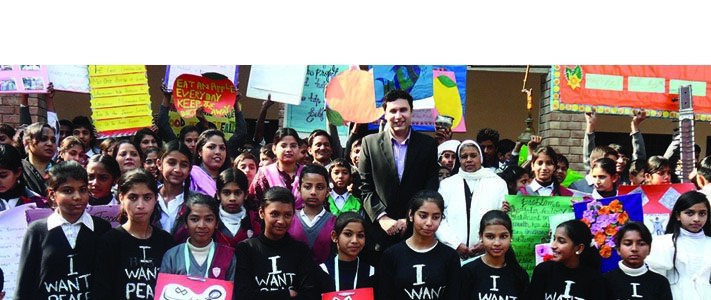How to set youth on a life-long trajectory of changemaking

- AshokaFollowAug 10 · 3 min read

What if our schools were designed to let young people drive positive change around them? This question has been animating Ashoka Fellow Ali Raza Khan for nearly 20 years. He founded YES Network Pakistan to transform Pakistan’s education system into an engine for changemaking. YES works with more than 1200 educational and vocational institutions across Pakistan, Zimbabwe & Kenya to give tens of thousands of young people their first experience making change, setting them on a life-long journey as problem-solvers.
Ashoka’s Nani Zulminarni caught up with Ali ahead of International Youth Day. They spoke about the urgent need to redefine what success looks like for young people — moving beyond an obsession with grades and recalibrating our expectations towards increasing everyone’s societal contributions. The key to making this happen? Trusting young people to lead. You can watch the full conversation here. Here are a few highlights.
Believe in others
Ali Raza started off as a public servant working on reproductive health. He was ready to leave his profession, unsure of the impact he was having, when he went to conduct a session in one of Pakistan’s most under-privileged areas. A large crowd of people was already waiting for him. Many doubted that he would listen and support the community’s needs. So, Ali listened, and began visiting the community after his office hours. Together, they realized that the best thing they could do to address reproductive health was unexpected: the community needed a school. Here’s what happened next.
<iframe width="663" height="382" src="https://www.youtube.com/embed/TUrHXjg-8pc" title="YouTube video player" frameborder="0" allow="accelerometer; autoplay; clipboard-write; encrypted-media; gyroscope; picture-in-picture" allowfullscreen></iframe>Redefine success for young people
This early experience made Ali realize that one of the biggest barriers keeping young people behind wasn’t necessarily their education or socio-economic level but the paradigm of mistrust that surrounds them.
Ali, who was previously full of doubts about his career path, found a new life-long purpose: unlocking the changemaking potential of all young people across Pakistan, and beyond. YES Pakistan was born a few years later in 2002.
As a society, we still measure students’ success largely based on their grades and their ability to memorize facts. Ali suggests we need to redefine success: no young person should be able to graduate from school if they haven’t used the power of imagination and changed lives in some way, big or small.
Extend the circle of trust to young people
Trusting young people to lead is at the core of YES Pakistan’s success. But how does it work in practice? Here, Ali describes the four key steps that has given young people across Pakistan, Kenya and Zimbabwe their first experience of changemaking.
They’ve now worked with 20,000 young people in Pakistan, Zimbabwe and Kenya. 92 percent of them were able to create social and economic impact, and 70 percent of them began to excel academically. Within weeks, young people have been able to turn a $25 trust-based investment into up to $2,000 — showing them a potential pathway out of poverty. Ali was quick to say that perhaps the most important impact of all is the fact that this experience starts young people on their life-long changemaking journey.
Education institutions are first movers
Ali is clear: it is in education institutions’ own interest to open the doors to changemaking.
Listen to the full conversation here.
